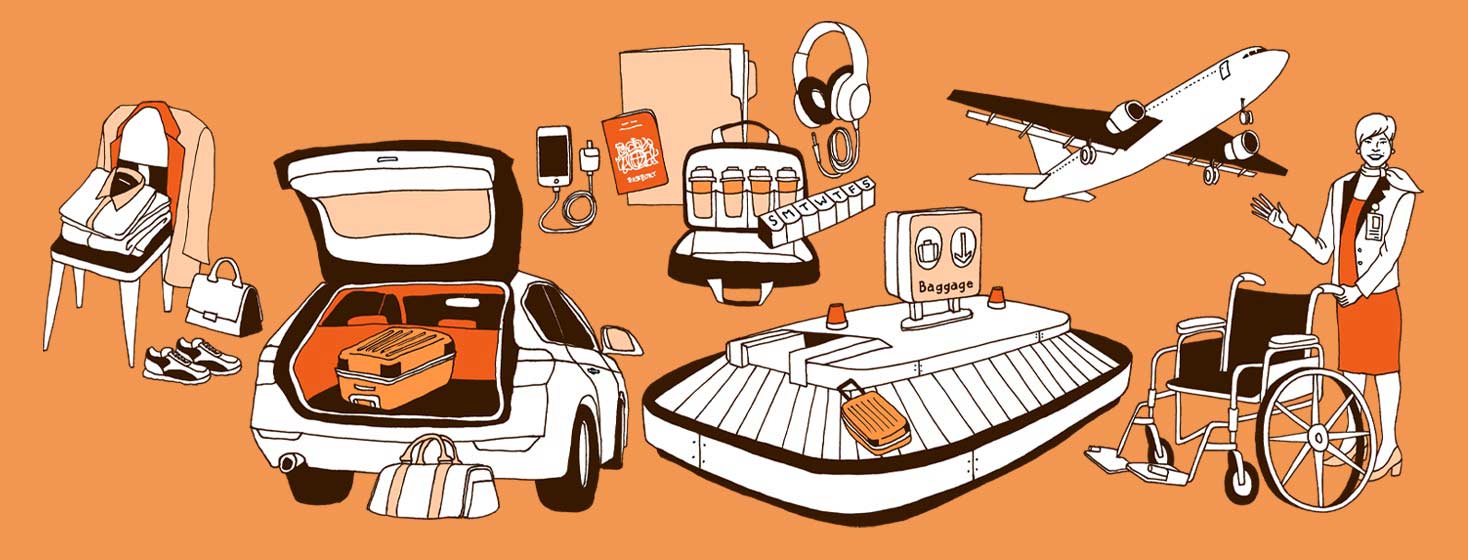International Travel: When Preparations Fall Apart
Traveling doesn't start the day you get on the plane, train, or bus; I think traveling starts from the day you purchase your ticket. From that moment you hit preparation mode.
Traveling with sleeping disorders, in particular, is a lot to prepare for.
Preparing for a trip
For me, that meant calling the airlines and making sure that they were okay with the medicines and medical machinery. I sent an email to my neurologist requesting a letter from the hospital to state the need for the CPAP machine to travel on the flight. The letter also listed the medications and dosage requirements for the trip.
This was my first time traveling through Taiwan and with China Airways. Since sodium oxybate is not legal in all countries, I emailed the airline to inquire about what they would need for me to travel with all my medicines and medical equipment. I searched online for experiences of other people traveling with narcolepsy through China Airways or China or Australia, and I took board advice about perhaps having the doctors' letters translated so nothing would be misunderstood.
I placed my order for five weeks of medicines and then took a moment to breathe. I had set everything in motion a good two weeks before I was due to travel. Now I could approach my holiday like anyone else and just embrace the excitement.
Then came the unexpected
My calm and excitement turned to stress the week I was due to travel. I had my most stressful pre-travel week, where it felt like my preparation had been futile.
I received the message 2 weeks before my departure date that my medicine was ready for collection at the hospital. I was unable to reach the hospital until the Monday before my Friday flight. When I reached the hospital, I was shocked to hear that my medicine was not ready, and though they told me to come they didn’t have the prescription.
Knowing time was limited, I opted to wait. I went to my neurologist's office and waited for hours to get another prescription issued. I spent over 4 hours in the hospital waiting for another prescription, searching for a working printer to print it, then waiting for the pharmacy to fill it. Then to add insult to injury, after waiting over half an hour for the pharmacist to prepare the medicine, they told me it wasn’t in stock and would take a couple of days to arrive.
I was livid, but to stop myself from having a cataplexy attack, I worked hard to contain any emotion. The staff asked if I was okay and said they’d put a rush on the medication and it would come the next day hopefully, but definitely Wednesday.
This or That
Do you make preparations for traveling with narcolepsy?
Deflated and exhausted
I left deflated and exhausted for home. I had to take London Underground home; although I was so sleepy and exhausted and would have benefited from just taking an Uber, my phone had already died. I missed my stop, ended up somewhere else, and had to catch another train backwards.
I did not get home until 8:45 at night, and I had my first conversation at the hospital about the medication at 3 p.m. I felt like my time had been wasted, since they knew medicine was not in stock when I arrived.
Things didn’t improve when I called Wednesday morning to see if the medication was ready and received the same nonchalant response "not in yet should be in by the end of the week," casually dismissing my frustration as not necessary since I still wasn’t leaving for 2 days.
I asked to speak to a manager who apologized for the run-around I had been getting and explained that the brand of the medicine prescribed was difficult to access. She said she could get the doctor to change it to the generic one and I could pick it the next day. I picked up my medicine grateful I could now move on from prep stress to the long travel day. I mentally prepared myself for any issues I would have while traveling, expecting to have to answer questions in China or Australia about the medications.
Wanting to feel more understood
Then came the plot twist: the only place where the medication was questioned and liquid medication tested was London Heathrow, at an airport I have frequented with the medicines without issue on many occasions.
At the end of the day I made it to my destination with all the medicines and equipment I needed. In my decades of traveling, there has been much improvement in accessibility for disabilities while traveling, and special assistance/wheelchair service makes getting through the airports and travel days much easier. However there is still more work to be done.
Traveling is not a privilege I take for granted. I know how lucky I am to travel around the world. I also know that this was my most stressful travel experience, so not the norm. But it would be nice to travel and feel a little more understood. For example, just because I’m not older and can walk doesn’t mean that the wheelchair assistance isn’t necessary. And airport staff could be more adapting to the multiple medical cabin bags that legally cannot be checked.
My advice for traveling with narcolepsy
My travel advice for anyone else who is traveling while living with narcolepsy is:
- Don’t procrastinate, and prepare, prepare, prepare
- Don’t let the extra work required stop you for embracing your wanderlust
- Use special assistance if you can; it’s a game changer
- Don’t be afraid to ask for what you need or speak up for yourself
Do you have any crazy or stressful travel stories with narcolepsy? Share them below.

Join the conversation